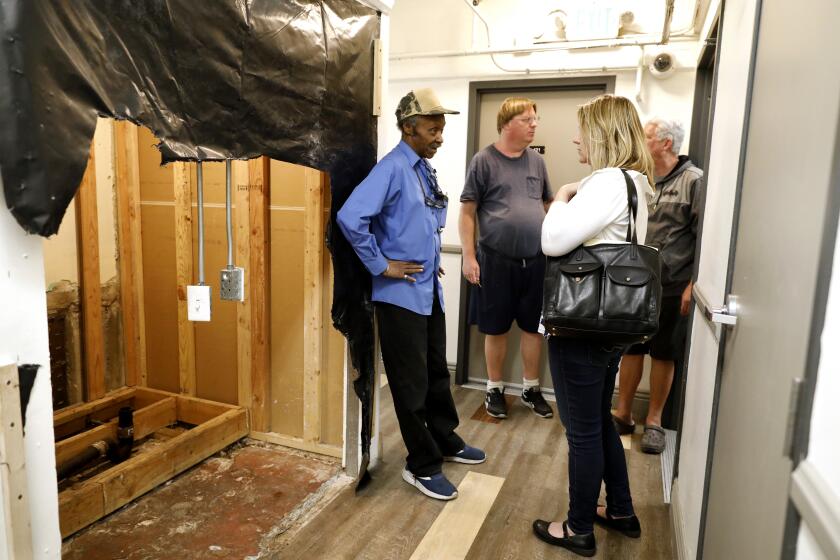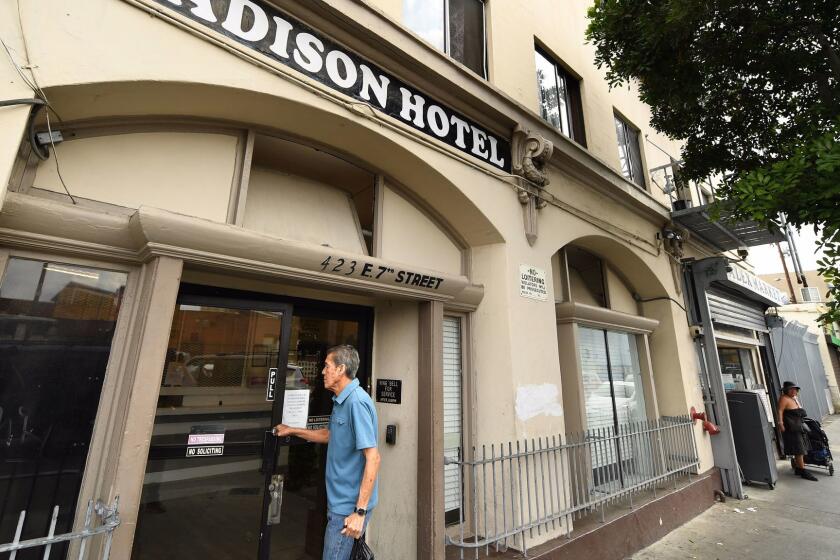A powerful nonprofit owns apartments for poor tenants. Why are some tenants trapped in their rooms?
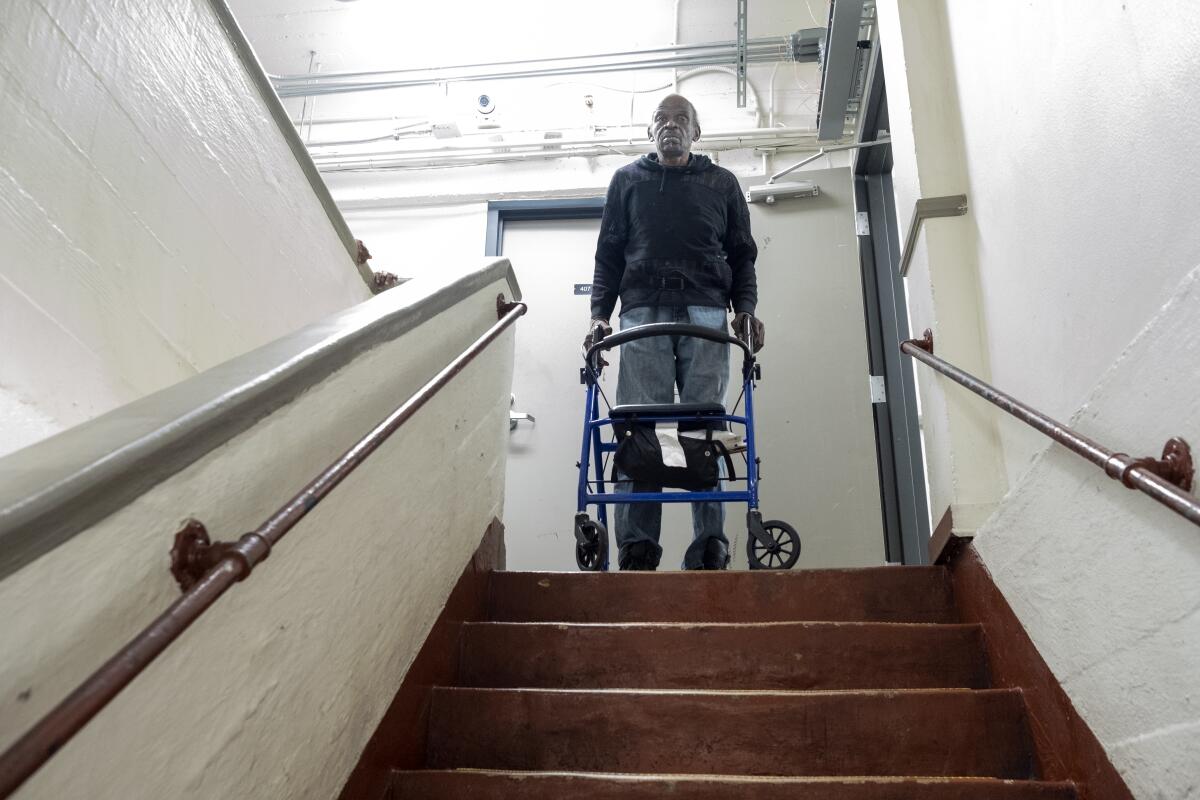
- Share via
For six days Richard Dever sat in his tiny fifth-floor apartment on skid row, desperate for some fresh air. But the elevator at the Madison Hotel was broken again, and Dever, 82, could not make it down the stairs.
Gaunt and short of breath from lung disease, Dever hunched on the edge of the bed, his mood darkening by the day.
“What bothers me is that I cannot get out like everybody else and enjoy the world,” Dever said on the second day of his confinement.
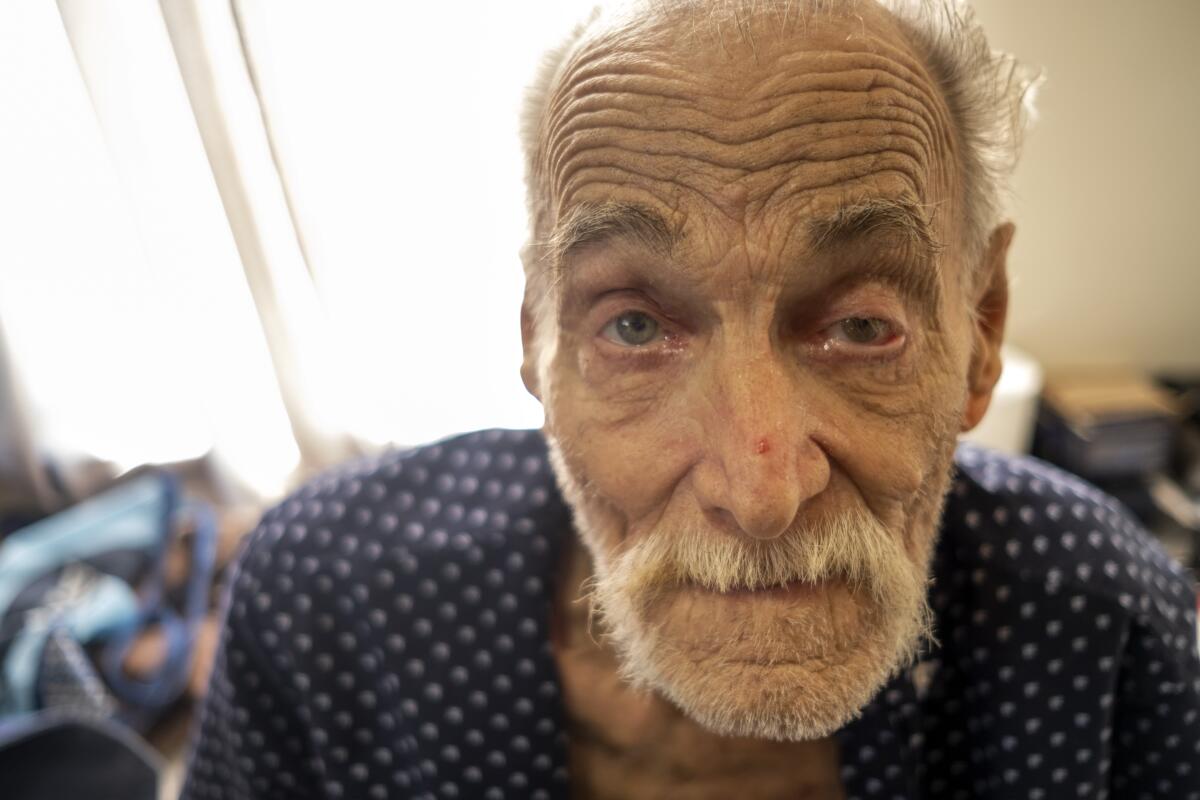
The nearly weeklong failure in December was the third time in just over a month that the Madison’s elevator was out of service for multiple days, Dever and other tenants said.
The building’s owner is one of the nation’s most prominent crusaders against bad landlords: the AIDS Healthcare Foundation.
In its more than five years running the Madison, elevator outages have led residents, many of whom are elderly and infirm, to sleep in the lobby, pay other tenants to carry them to their rooms or remain trapped on the upper floors.
In 2018, after a blind tenant fell more than 12 feet down the open shaft, the elevator was out of service for seven months, according to Los Angeles city records and court testimony. It reopened but soon failed again, remaining broken for the better part of a year. Large-scale repairs started only after building inspectors threatened to turn the case over to the city attorney’s office for a criminal investigation.
The foundation is best known as a behemoth in the healthcare industry, with nearly $2 billion in annual revenue earned largely from its chain of pharmacies and clinics. But in recent years, the L.A. nonprofit has become one of the biggest funders of pro-tenant causes in the country, pouring tens of millions of dollars into political campaigns to expand rent control in California and organizing renters against eviction and exploitation by landlords.
The foundation purchased the Madison in 2017 — the first of more than a dozen single-room-occupancy and other apartment complexes it owns on skid row, Hollywood and in other Los Angeles neighborhoods. Foundation leaders say their goal has been to provide homes to low-income residents more quickly, cheaply and humanely than private developers, public agencies and other nonprofits.
They’ve publicized their efforts in full-page advertisements in The Times and through near-daily social media posts, touting their work as “a massive success.”
But Madison residents say that the foundation’s treatment of them pierces the claims about caring for L.A.’s most vulnerable.
In March 2021, 18 Madison tenants filed a lawsuit over the elevator. They alleged that its failures discriminate against those with disabilities, violating access and civil rights laws. Twelve have settled with the foundation, and one dropped out. The remaining five plaintiffs are seeking millions of dollars in damages and a court order for a judge to oversee permanent repairs to the elevator or force the foundation to install a new one.
A jury trial is scheduled to begin in Los Angeles County Superior Court as soon as Friday. Multiple other lawsuits over conditions at the Madison also are pending.
“In my opinion, the advertisements do not match the actions,” said Annette Harings, the tenants’ lead attorney. “The righteous indignation of AHF in all of its public advertisements, all of its press releases, all of its legal pleadings pumping themselves up about how awesome they are, does not reflect what is happening at the Madison.”
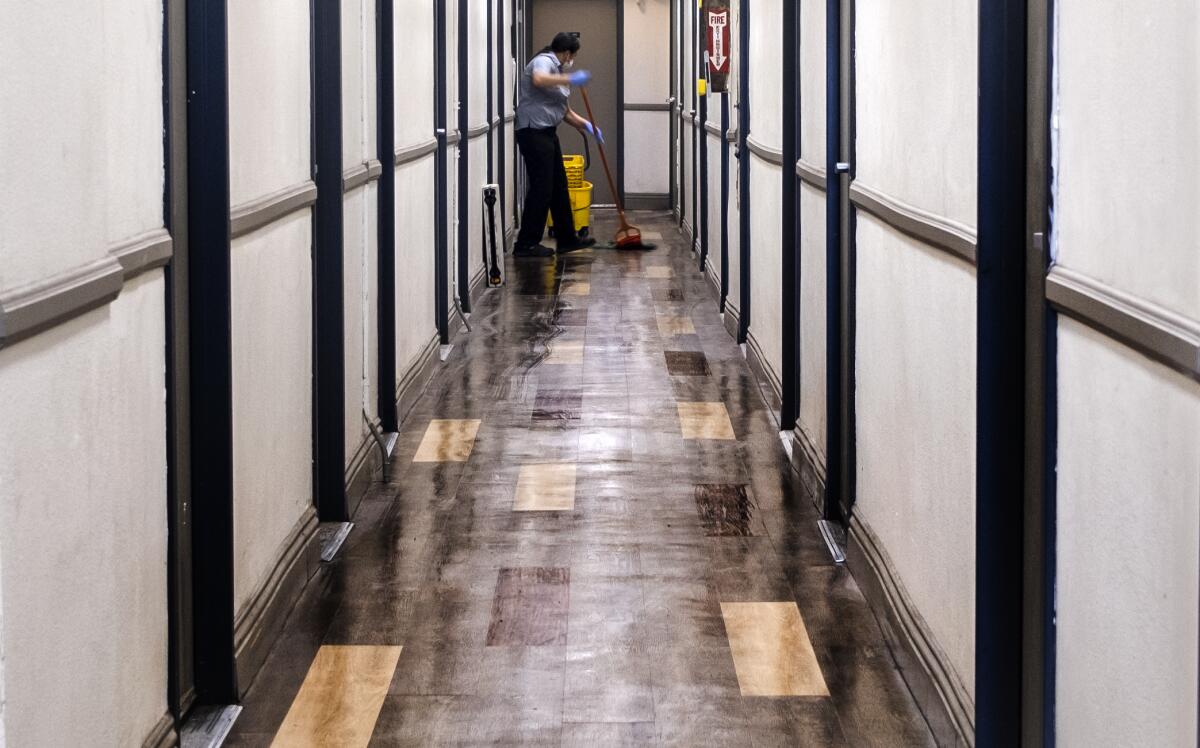
Harings contends that AIDS Healthcare Foundation co-founder and President Michael Weinstein and the group’s attorneys have compounded the harm by pushing plaintiffs to accept low-ball offers behind their lawyers’ backs. Residents, some of whom have learning disabilities or were behind on their rent, have received settlement packages thousands of dollars less than what the foundation offered when their attorneys were present, court records show.
Weinstein and other foundation executives declined an interview request from The Times. Foundation spokesperson Ged Kenslea said it was too close to the trial and blamed The Times’ inquiries on the tenants’ lawyers, alleging they were trying to improperly influence the outcome.
“We consider it unethical for counsel on either side to seek to prejudice prospective jurors,” Kenslea said.
Foundation lawyers have argued in court filings that the nonprofit operates the Madison as a charitable endeavor and that it has already spent hundreds of thousands of dollars to repair the elevator. Further fixes, they said, would be too costly and are unnecessary because they’ve offered to move affected tenants to lower floors in the Madison or to other properties. Additionally, AIDS Healthcare Foundation blames the Madison’s previous owner for the elevator’s failures and the city of Los Angeles for not signing off on proposed repairs fast enough.
The foundation so far has agreed to pay out more than $700,000 to settle with 12 of the tenants in the case.
AIDS Healthcare Foundation has said it can house homeless people better than the city. But, in a new lawsuit, tenants allege slum-like conditions.
Formed in 1987, the foundation is the largest AIDS nonprofit in the world, providing care through its network of clinics and pharmacies to more than 1.7 million patients across 45 countries. About eight years ago, Weinstein began getting involved in housing battles in L.A. and across the state, contending that luxury real estate developers and corporate speculators are causing California’s affordability woes.
The foundation bought the Madison for $8 million. The nearly century-old building has about 200 units across five floors, with most residents sharing common bathrooms. Monthly rent is about $400, an amount below even what other residential hotels on skid row charge. Tenants say that low cost is the main reason they live there despite the problems.
The Madison’s elevator relies on the same basic mechanics as when it was built in 1924. Tenants and guests must slide open an exterior door and then a metal gate, both of which must be closed before the cab will start moving.
Its frequent failures have had serious consequences.
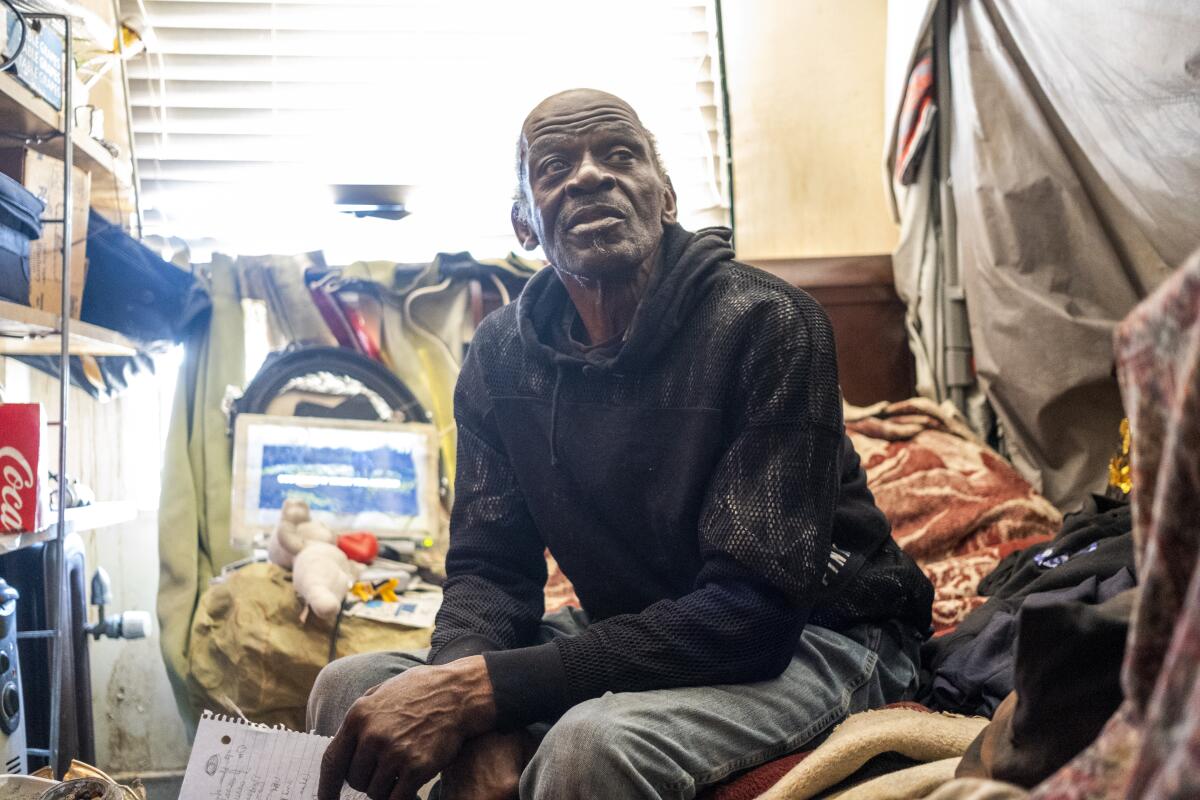
One morning in 2018, an employee heard screaming coming from the elevator shaft between the second and third floors. When the employee arrived on the third floor, he found the elevator door open and looked down the shaft to see Kenneth Owens, a legally blind, then-66-year-old tenant, sitting in pain on top of the cab, according to an internal incident report the employee filed.
The elevator door had opened even though the cab wasn’t there. Owens took one step, then plummeted.
“Like a cartoon character, like Wile E. Coyote, that puff of smoke when he’s running,” Owens said in his deposition. “Then my hat was flying in the air and bam, 12 and a half feet down.”
The foundation later signed off on paying Owens $125,000 to resolve the matter, according to a settlement reviewed by The Times.
The AIDS Healthcare Foundation oversees a global philanthropic empire that extends from its Hollywood headquarters to 15 states and 38 countries.
Tenants said in depositions that the elevator outages can dominate their lives. Owens said he has paid other residents to carry him up the stairs when the elevator was out of service. Each trip cost him $40.
Grace Antisdel, a 73-year-old tenant who has asthma and uses a wheelchair, said in a deposition that she slept in the Madison’s lobby for more than a month because it was too painful to go up and down the stairs.
Renee Schoen, a former tenant who also uses a wheelchair, said in her deposition that she used to navigate the building by “practically slithering” up its staircases. Even when the elevator was working, she said, it is so small that she couldn’t turn her wheelchair around inside and had to roll backward to exit. Once, Schoen didn’t realize that the elevator had stopped just short before it reached the lobby and she fell onto the ground.
“The boom backwards hurt my body for a good moment,” said Schoen, 54.
The problems at the Madison predate the foundation. Seven months before the sale, Kameron Segal — the building’s previous owner — settled a lawsuit filed by more than a dozen tenants who alleged that he had harassed them and failed to make needed improvements. The settlement required immediate repairs any time the elevator malfunctioned.
When the new group of tenants sued the AIDS Healthcare Foundation, it filed a cross-complaint against Segal, alleging he had defrauded the foundation by not disclosing the settlement or problems with the elevator. Segal did not respond to the foundation’s lawsuit, and the court issued a default judgment against him. Segal could not be reached for comment by The Times.
Others say that basic due diligence prior to purchasing the building would have revealed both the settlement, which was publicized in news releases, and issues with the elevator. Steve Diaz, deputy director of the Los Angeles Community Action Network, an organizing group that assisted Madison residents in the lawsuit against Segal, said circumstances at the building were common knowledge throughout skid row.
There is no definitive timeline of when the elevator has been out of service. But court records show that it was shut down multiple times for extended periods after the foundation purchased the building and, when operating, has frequently malfunctioned.
In declarations taken both in the spring and fall of 2021, residents described frequent outages, especially on weekends. In interviews, they say it still malfunctions as often as multiple times a week.
The foundation says in court filings that it’s already spent more than $400,000 on maintenance, repairs and improvements to the elevator. It blames delays on difficulties in finding parts for such an old elevator and problems with city inspectors.
In a cross-complaint against the city and the Los Angeles Department of Water and Power, the foundation said inspectors dragged their feet when it needed to upgrade the Madison’s power supply, which foundation officials contend was the primary cause for the elevator outages. The foundation asked for damages and for the city to indemnify it in the case brought by tenants. The city and public utility admitted no wrongdoing but paid the foundation $100,000 to settle the case in December.
Mia Rose-Wong, a spokesperson for the utility, denied that power issues caused the elevator problems, saying inspectors did not delay their work and that the utility only settled to save ratepayers the expense of a lengthy trial.
Current problems with the elevator, the foundation says, result from tenants’ impatience and errors, primarily when they have to open and close the door and the gate manually.
Replacing the elevator with a new one or making further large-scale repairs would be “an undue hardship such that the cost would be disproportionate to the benefit that would be received,” Kyle Maland, an attorney representing the foundation, said in a court filing.
An elevator expert hired by the plaintiffs estimated in a deposition that a new elevator would cost no more than $375,000. The foundation’s most recent annual financial report shows that it has more than $200 million in cash on hand and $1 billion in assets.
The Times visited the Madison last month when the elevator was out of service. In the hallways, tenants asked one another if they knew when it was going to work again.
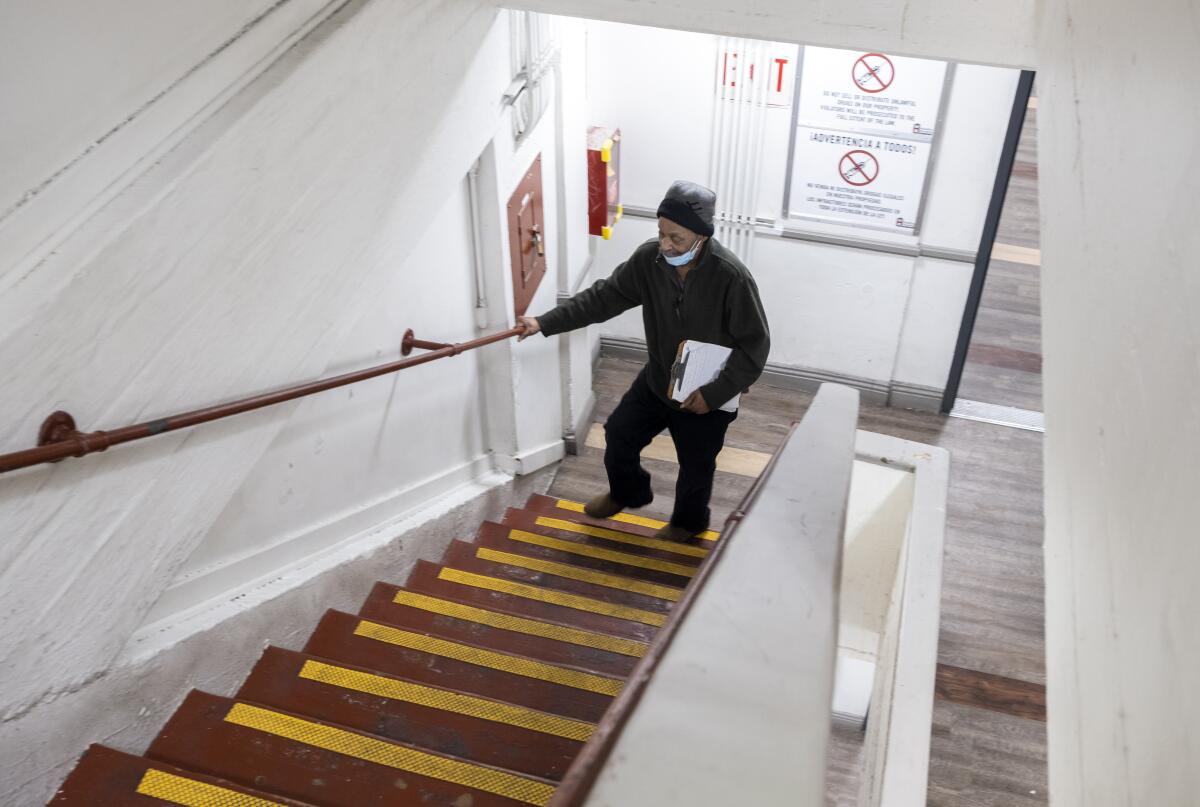
After climbing two flights to his room, Edwin Linwood was breathing heavily. When the elevator is down, Linwood, who suffers from lung disease, needs as many as three inhalers to get through the day.
The 71-year-old was part of the settlement with the previous owner over conditions at the Madison. He feels deep frustration that the problems have yet to be resolved.
“In my opinion, they can’t pay me enough,” said Linwood, who also suffers from sciatica. “It’s not the cash that I want. This is where I live. This is my home. The main objective is to fix the elevator.”
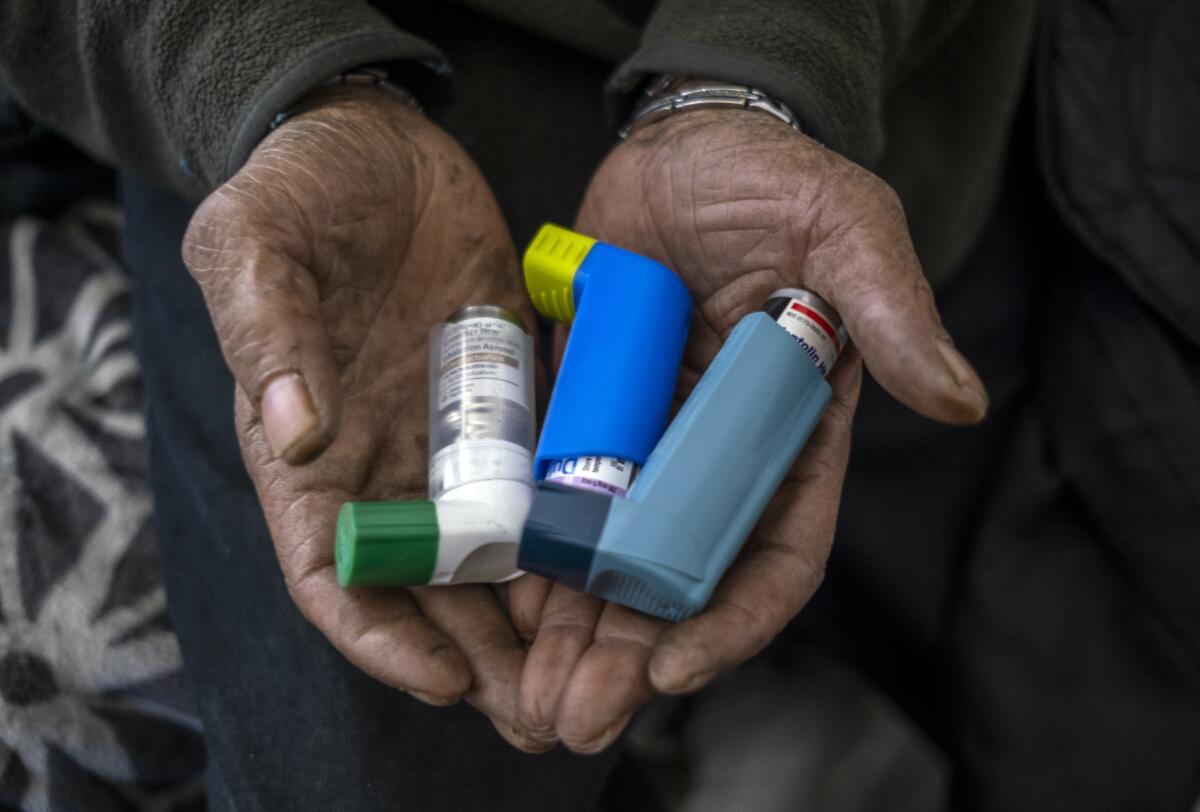
Linwood is one of five tenants who so far have refused to settle with the foundation, whose tactics that have come under fire in court.
Tom Myers, the AIDS Healthcare Foundation’s general counsel, in 2021 made settlement offers directly to tenants in the elevator lawsuit and a related one that alleges overall uninhabitable conditions at the Madison, L.A. County Superior Court Judge Stephanie Bowick found. Bowick determined Myers broke legal ethics obligations by not involving the tenants’ attorneys in the discussions. Myers did not respond to a request for comment.
Last July, Weinstein directed the foundation’s regional property manager to try to reach deals in the elevator case again without involving the tenants’ lawyers. In a sworn statement filed in court, Weinstein said he wanted to exclude Harings.
“It seems to me that Ms. Harings is not looking out for her clients’ interests, and instead is manipulating her clients to attack AHF,” Weinstein wrote.
When the AIDS Healthcare Foundation campaigned unsuccessfully this spring for a ballot measure to crack down on “mega projects,” affordable housing developers argued the proposal would hurt poor renters and thwart sorely needed construction.
Brenda Phillips, a tenant who is still suing, said in a sworn declaration that the property manager invited her into an office at the Madison and offered her $8,000 if she signed a letter about the elevator case.
“I told him I had to read it before I decided to sign it,” Phillips said. “But I cannot comprehend what I read because I have a learning disability. So I pretended to read the letter. The letter was a full page of words and a place to sign at the bottom.”
Phillips said that she asked for a copy so someone could read it to her, but that the property manager told her he would give her one only after she signed. She declined the offer.
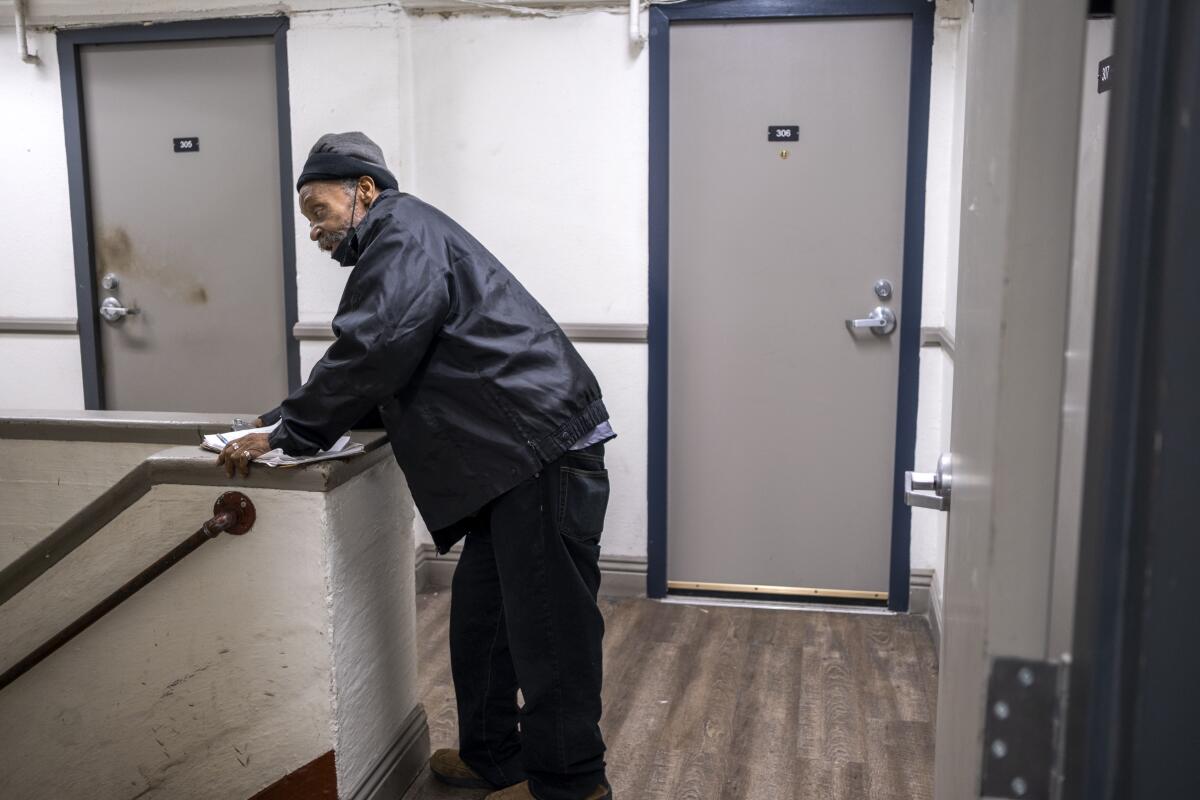
Four other tenants in the lawsuit, however, did sign that paperwork, settling for $8,000 apiece, according to court records and interviews.
A month later, the foundation’s attorneys made settlement proposals — this time through Harings — to Phillips and the remaining plaintiffs for $20,000 each. Those were all rejected. In late December, six plaintiffs accepted settlements offered through their attorneys for $80,000 apiece. Then last week, two other plaintiffs accepted $100,000 settlements through their attorneys.
The Times’ Liam Dillon and CalMatters housing reporter Manuela Tobias chat about the latest developments in California housing policy and interview key newsmakers and other reporters. Available on Apple, SoundCloud, Spotify, Google and Stitcher podcasts.
William Berry was one of the four tenants who agreed to an $8,000 settlement.
He has arthritis in his knees and often uses a wheelchair. As he spoke with a reporter last month, Berry gripped the railings with both hands and dragged himself up the Madison’s stairs to reach his second-floor room.
Berry, 61, said he agreed to the settlement, which also erased his past-due rent, because he needed the money.
He said he was not aware of the higher offers the other tenants received until informed by The Times.
“I wish you hadn’t have told me that,” Berry said.
More to Read
Sign up for Essential California
The most important California stories and recommendations in your inbox every morning.
You may occasionally receive promotional content from the Los Angeles Times.
